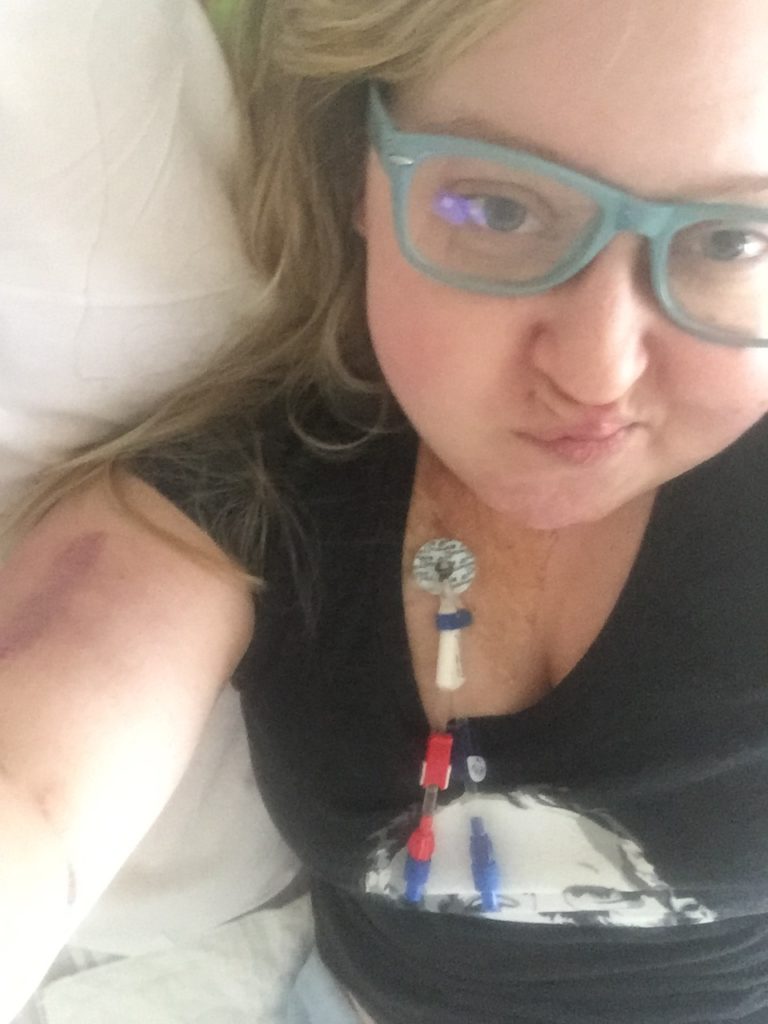
Choose Your Language:
Posted by: The Sumaira Foundation in NMO, Patient, Voices of NMO
 I was diagnosed with NMO on March 10, 2015…
I was diagnosed with NMO on March 10, 2015…I assumed that once a reason for all of what was happening was determined, the doctors could fix it; it hit me like a ton of bricks when I found out that there was no cure. My life as I knew it had completely changed, and this was just the beginning.
Working in retail management during the holidays is stressful; I don’t think that comes as a surprise to anyone. The week of Christmas 2014 was an awful, literal headache that would not let up. I awoke Christmas morning with a shadow on the inside of my left eye – Merry Christmas to me, right? The day after Christmas, I went from my primary care doctor on Cape Cod, to an ophthalmologist in Plymouth, to a neuro-ophthalmologist in Boston. Even after being admitted to the hospital for the weekend to have more testing and imaging done to find a cause, there was no solid answer. I left with a diagnosis of Optic Neuritis [ON] and a big question mark next to why this was happening to me.
Early in February 2015, I woke up one morning to extreme weakness in my legs and at that point, knew something was really wrong. Another trip to the ER, my 4th in 6 weeks, landed me my 3rd admission to the hospital for inpatient treatment. Healthy 27 year old women don’t just lose the ability to walk without a cause. All the testing the doctors were doing had me convinced they would find a reason, the cause for me to lose the vision in my left eye and my inability to walk, a name for whatever it is that was causing these things to happen to me. They came up with nothing and I had never been more scared in my life.
Ten days after being admitted to the hospital for paralysis, I was transferred to a rehabilitation hospital to begin the road to recovery. The lower limb paralysis left me with numbness and tingling in my feet, lack of temperature sensation over most of my body, the constant, awful feeling of a sunburn on my skin being repeatedly slapped from my rib cage down, and an overactive bladder. I worked with physical and occupational therapists to regain strength throughout my body, work on my fine motor skills, learn how to bathe and groom myself with my new physical limitations, and to toilet train myself. Again, I have never felt as helpless as I did when I was trying to regain control over my body, while knowing in the back of my head that I would never have the body I did before this all started.
At my first appointment with a neurologist at Rhode Island Hospital, I was given my diagnosis of NMO. Even though I had tested sero-negative for 
My biggest obstacle was controlling my stress levels and learning what my physical limits were; I needed to stop pushing myself too hard. I wasn’t clicking with my neurologist and knew I needed to make a change. With a friend’s help in August 2015, I found a new neurologist and have since built an amazing team of doctors to help me through this journey. The new neurologist referred me to a gynecologist that specializes in female pelvic medicine, including bladder health. This doctor was the piece of the puzzle that was missing for me; together we worked to find a way to stop the overactive bladder issues, like peeing my pants in public! Once I had control of my bladder back I felt more in control of the disease as a whole. I felt more like myself and not as trapped by my body and my “new normal.”
It has been almost one year since I have had a flare, but every so often, I do experience pseudo-flares that alter my vision. Though these flares aren’t indication my disease is progressing, they do require a smaller dose of IV steroids to reduce the inflammation of my optic nerves. I have been out of work on disability since February 2015 and it has been a HUGE adjustment. Working in retail management requires a lot of energy and you are constantly on your feet, on the go, and that’s energy I just don’t have at the moment.
Simply put: right now my body is not able to perform the way it did prior to my diagnosis. I am hopeful that I will be able to return to work in the near future because it is something I truly miss hopefully I’ll be able to live a more “normal” life once my body becomes more stable in my diagnosis.
Published on May 31, 2017.